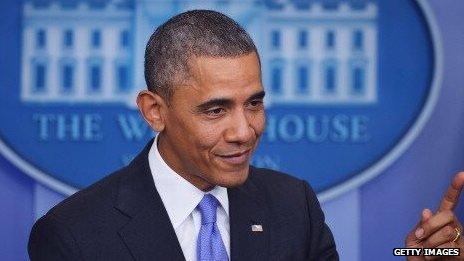Obama's healthcare 'lie of the year'
- Published
- comments

Obama's 'lie of the year' has conservatives crying foul
On Thursday, the Tampa Bay Times' fact-checking site PolitiFact awarded President Obama's statement, "If you like your healthcare plan, you can keep it", as its "Lie of the Year".
"Thanks for nothing," was the general consensus among conservative commentators.
In her article on the choice, PolitiFact's Angie Drobnic Holan writes, external:
Obama's ideas on health care were first offered as general outlines then grew into specific legislation over the course of his presidency. Yet Obama never adjusted his rhetoric to give people a more accurate sense of the law's real-world repercussions, even as fact-checkers flagged his statements as exaggerated at best.
Instead, he fought back against inaccurate attacks with his own oversimplifications, which he repeated even as it became clear his promise was too sweeping.
The debate about the health care law rages on, but friends and foes of Obamacare have found one slice of common ground: The president's "you can keep it" claim has been a real hit to his credibility.
The announcement prompted considerable scorn from the right.
"So PolitiFact says the president's keep-your-health-plan promise is the lie of the year," write, external the editors of Investors Business Daily. "And indeed it is. But where was PolitiFact four years ago when the lie was first uttered and calling it a lie meant something?"
If PolitiFact had called the statement a lie during the drive to pass the Affordable Care Act, they argue, maybe it would never have become law.
"On the one hand, it is good that PolitiFact is holding the president account for a lie involving such a major and far-reaching law," writes, external Sean Higgins of the Washington Examiner. "But Holan's column gave her readers the impression that PolitiFact has been on the case regarding this for quite a while, stating that 'fact-checkers flagged (Obama's) statements as exaggerated at best.'"
On the contrary, he writes, Politifact rated Obama's previous statements as either "half-true" or "true": "It rated him on the basis of whether he was accurately stating his own campaign promise, a hurdle no politician could fail to clear."
James Taranto of the Wall Street Journal writes, external that the problem with PolitiFact and other "fact checking" sites is that they use editorial judgment, and bias, in determining what is and isn't the truth:
One might have reasonably suspected, in 2008 and certainly in 2009 and 2012, that Obama was lying. But one could not prove it, because it was not yet a factual assertion. In 2008 it was but a promise, which Obama might or might not have intended and might or might not have been able to keep. By 2012, we now know, it was a full-fledged fraud, but exposing it conclusively as such would have required a degree of expertise few journalists have.
In other words, it's not that PolitiFact was wrong to withhold its jejune "pants on fire" designation from the Obama statement in 2008, 2009 and 2012. It was wrong even to make a pretense of "fact checking" a statement that was, at the time, not a factual claim. Its past evaluations of the statement were not "fact checks" at all, merely opinion pieces endorsing ObamaCare.
Tim Graham, with the conservative media watchdog group Media Research Center, echoes, external Mr Taranto's argument: "PolitiFact has only drawn a yellow Hi-Liter through what's wrong with liberal media-elite 'fact checking' patrols: It exploits their 'objective' image as it declares a campaign promise as factual (or not) prematurely, before there's any factual reality to judge. "
And, for good measure, here's Allapundit, external on the blog HotAir:
The fact that it took until 2013 for them to identify "if you like your plan" as a mammoth lie is proof that the media's collectively either out of its depth in analysing policy - even when scores of conservative policy experts were willing and able to help them identify problems with the law - or uninterested for political reasons in recognizing the law's flaws until they're so glaring that they can't plausibly be ignored. This really is the Lie of the Year, and outfits like PolitiFact are entirely complicit in it.
Kevin Drum of Mother Jones provides a liberal counterpoint, external to conservative criticisms:
If you ask me, the real takeaway from this list is that 2013 was a pretty good year for lies. Seriously. Obama's promise about keeping your health care plan actually has a lot of truth to it. In the end, probably no more than 1 percent of American adults will end up being forced to switch to a health care plan that's either more expensive or provides less coverage than their current plan. Obama was obviously more unequivocal than he should have been, but really, this has never been much of a lie.
But it was apparently the biggest of the year. I don't know if American politicians made up for that by telling an unusually large number of little lies, but it sure looks like we had a pretty good year for avoiding whoppers.
CNN's Brianna Keilar asked White House press secretary Jay Carney about Politifact's "award", and he said, external that Mr Obama had addressed the question and expressed his sympathy for those who have had their individual market healthcare plans cancelled. "End-of-the-year categorisations like that are always fun, even when they don't jive with past characterizations of the same exact statement," he said. "But, we're focused on the implementation of the Affordable Care Act."
For now, conservatives are focused on telling the "left-wing hack site, external" Politifact how they really feel.